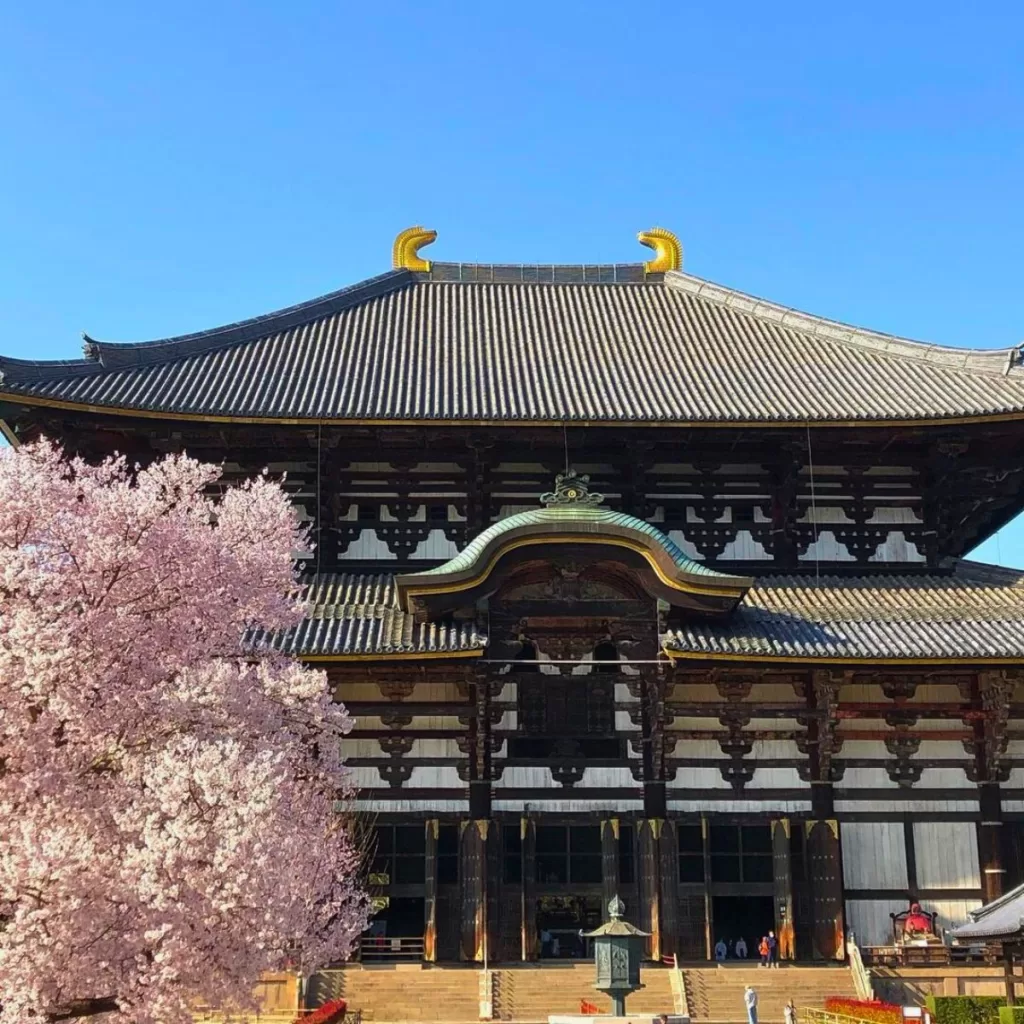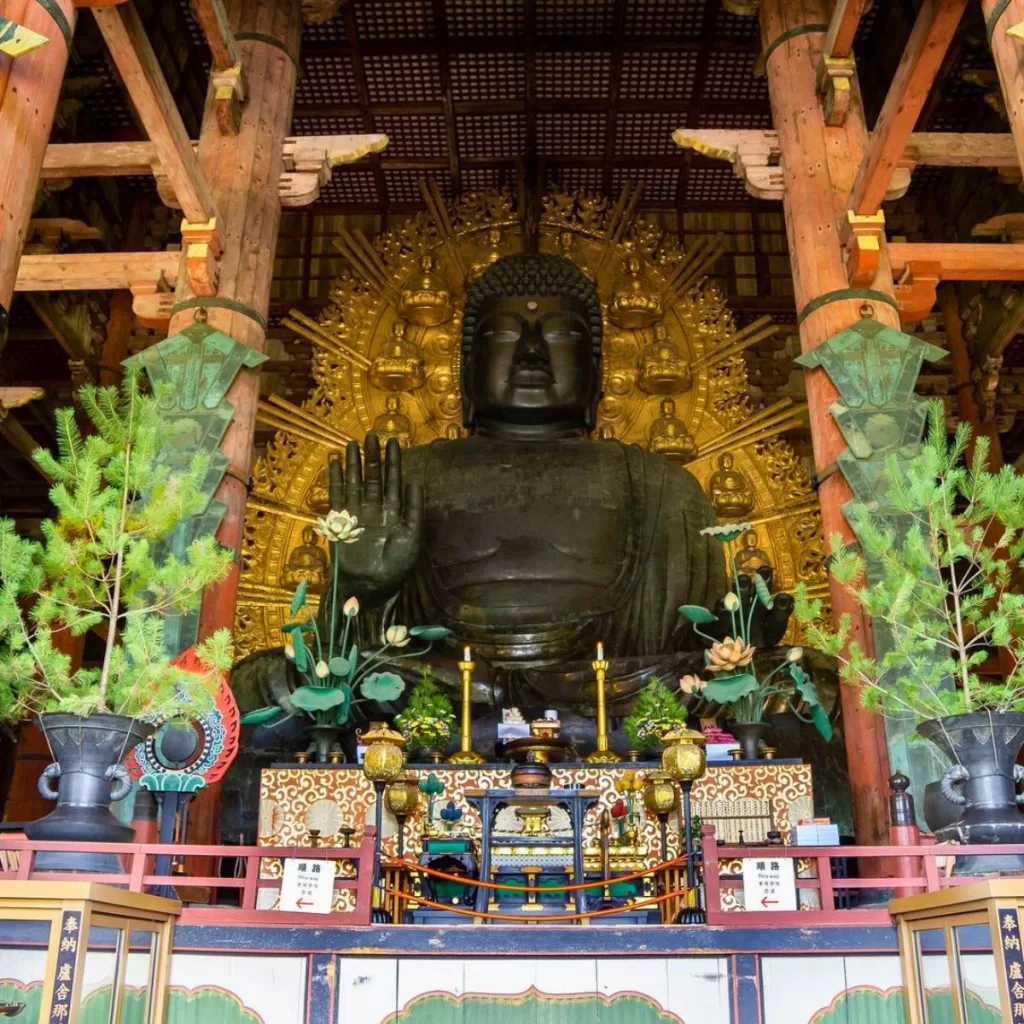Todaiji Temple: Home of Nara’s Massive Daibutsu Buddha
History of Todaiji Temple
Todaiji Temple, known in Japan as Todai-ji, has a rich history that goes back centuries. The temple was originally built in 752 during the Nara era under the orders of Emperor Shomu. It was established as the head temple of all provincial Buddhist temples of Japan.
During the Nara Period, Buddhism became significant in Japanese culture and politics. Todaiji Temple was constructed in line with this religious growth. Touted as a sign of peace and tranquility, it also served as an emblem to unify the provinces under a centralized government.
Sadly, the original temple was ruined due to fires caused by wars and unrest over the years. However, it underwent several reconstructions, most notably in the Edo period during the early 18th century when the Daibutsuden (Great Buddha Hall) was last rebuilt.

Todaiji Temple, The World’s Largest Wooden Structure
Todaiji Temple is famous for being home to the world’s largest wooden structure. This historic temple in Nara features the Daibutsuden, which is recognized as the largest wooden structure globally.
Daibutsuden is also called Great Buddha Hall due to its enormous bronze statue. Despite being two-thirds of its original size after being destroyed and rebuilt twice, it stands impressively at 48 meters tall.
Apart from its colossal size, Todai-ji Temple draws interest due to its artistic beauty in architectural and sculptural details representative of Japanese aesthetics and craftsmanship.

Unveiling The Giant Buddha Statue
Entering the Great Buddha Hall reveals an awe-inspiring sight—the colossal bronze Buddha statue, recognized as one of the largest bronze effigies of Buddha globally. Seated and reaching 15 meters in height, this statue represents Vairocana, the Great Illuminating Buddha or simply “Great Buddha.”
Also, flanking statues, including life-size carvings representing the Nio Guardian Kings, can be found within this majestic hall. The presence of these figures lends an even more spiritual aura to the Todai-ji Temple.
Exploring Other Key Structures In Todai-ji Temple
Todaiji Temple consists of more buildings beyond just Daibutsuden. One important structure that grabs attention upon entering is Nandaimon Gate or The Great South Gate. This gate dates back to AD 1199 and holds two fierce-looking statues of wrathful deities believed to guard Buddhist teachings.
Other noteworthy structures include lecture halls where monks sought enlightenment through rigorous studies. Among these are Nigatsudo Hall—an iconic location with panoramic views of Nara city—and Hokkaido Hall—home to an impressive collection of historic Buddha images.
Close-by landmarks within temple grounds are Museum Todai-ji and KashoTo tea house – perfect destinations for cultural immersion during your trip to Japan.
UNESCO World Heritage Site Status
Due to its historical significance, rich cultural value, architectural marvels, and landmark status among temples in Japan, Todaiji Temple received itself on UNESCO’s list of World Heritage Sites in 1998.
The complex’s preserved landscapes offer an authentic feel dating back many centuries while displaying some original elements from when it was first constructed in 752 – despite undergoing reconstructions.
As such, visitors can appreciate ancient artistry combined with serene natural surroundings—creating a unique visitor experience attracting individuals across different age groups or walks of life around the globe—all year round!
Visiting Todai-Ji And Things To See
A visit to Kyoto typically includes day trips to outlying cities within Kyoto Prefecture—one of them being historic Nara city, where this great eastern temple is located. From traveling via JR Nara Station or traversing deer-filled parks while on foot from Kintetsu Nara Station—a trip to Todai-ji is a highlight on one’s Japan travel itinerary.
Once through Nandaimon Gate—gateway to the main sanctum—visitors find themselves surrounded by buildings steeped deep history waiting to be discovered! Besides buildings like Gorinto—a five-story pagoda considered a national treasure—you’ll encounter oversized effigies surrounding the entrance meant to ward off evildoers attempting to harm sacred establishments!
Also worth exploring during your visit—the extensive deer park adjoined the temple premises makes a delightful place to take leisurely walks while feeding adorable Nara deer, often spotted grazing greens nearby, deemed sacred according to legend!
Tourists especially look forward to seeing towering attractions like the standing Bhaisajyaguru statue (Medicine Buddha) housed Sangatsu-do Hall or inviting Kaidan’in (ordination hall)—both allowing glimpses into how Buddhism played a significant role in shaping traditional Japanese culture throughout centuries!
Overall—if you’re planning to visit Land Rising Sun—don’t forget to include a trip to a beautiful and historically significant destination that offers a lot to every tourist who steps onto sacred grounds!
Museum And More Attractions
While temples make heart attractions here, do take time to uncover other gems within a massive complex! Apart from a sprawling park filled with friendly deer—enter the museum situated in the eastern part of the temple grounds—It was once used as monk housing and is now dedicated to displaying precious artifacts related to Todai-ji, like sutras (Buddhist texts), prayer beads, etc., preserving the essence of ancient religion traditions passed down through generations!
If time permits, don’t miss watching traditional ceremonies held occasionally inside grand halls, each adorned with eye-catching décor showcasing intricate artworks spanning ages, unabashedly revealing the evolution of Japanese art over time!
In a nutshell, the majestic towering structure’s allure, the expansive greens surrounding the premises, and the welcoming deers make an unforgettable experience for every traveler, ensuring their memories and cherish a lifetime after their trip to the magnificent Land Rising Sun!